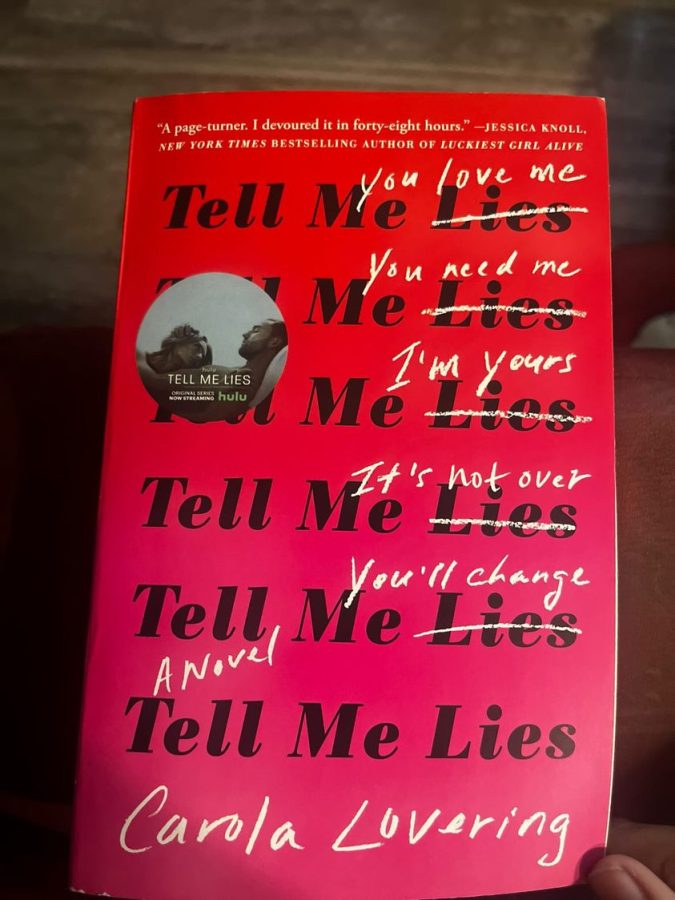‘Tell Me Lies’ Fails to Tell a Compelling Story
A copy of the book “Tell me Lies” sits on a reader’s desk.
April 14, 2023
“Tell me lies, tell me sweet little lies,” Stevie Nicks repeats in Fleetwood Mac’s 1987 song “Little Lies.”
The song in which Carola Loverings’ debut novel, “Tell Me Lies,” is based off of.
But unlike the song in which it got its name, Loverings “Tell Me Lies,” drags on for a bit too long, its repetitiveness not falling in its favor.
In what was supposedly a dizzying and sensitive exploration into the world of toxic relationships and grief, “Tell Me Lies,” turns into a repetitive and melodramatic, fell-in-love-with-the-wrong person trope, with insufferable characters and writing that feels painfully juvenile.
“Tell Me Lies,” is told from the perspective of both Stephen DeMarco and Lucy Albright: two students from opposite worlds, attending a small California college.
Where Fleetwood Mac-loving Lucy is an eager and gullible college freshman, excited for the chance to finally get away from home, Stephen is predictably the opposite- a cocky junior who lacks empathy and takes delight in manipulating women.
So of course, after a meeting at a college party, Lucy and Stephen have an instant connection. A connection that lingers for years, despite all of the heartache that comes with it.
The novel goes back and forth between each chapter, giving both Lucy and Stephen the opportunity to narrate, and giving the reader the opportunity to take a look into each of their feelings for each other over the course of several years.
And for almost 400 pages the feelings drone on. Lucy and Stephen shift from being together, breaking up, fighting and forgiving, a long and drawn out cycle that becomes almost nauseating, and leaves the reader wondering how many more pages there are to get through.
Each sentence of the novel is lazy and predictable, turning the chapters into a long jumble of words that give away nothing besides the constant repetition of fighting and forgiving. Boredom was already creeping into my mind before hitting the 20th page, and before long “Tell Me Lies” started to read more like 2013 Wattpad than an actual novel.
If it weren’t for Stephen’s narrations, the book would display nothing new, just the same recycled storyline of a toxic relationship.
“Manipulation is not a bad word,” begins chapter 14, the first sentence immediately alerting the reader of Stephen’s narration, as he goes on for half a page to rant about how women are sensitive, annoying and have too many hormones.
Loverings’ attempt at uncovering Stephen’s emotions is what sets the novel apart from the usual trope, though it proves to be remarkably unsuccessful, unless the purpose of the novel was to hate Stephen and partially like Lucy.
But that didn’t seem to be the purpose at all, because Lovering takes the reader through the winding roads of Stephen’s past for a bit too long. Subtly focusing on his heartache, detailing his grief and the hardships he hasn’t been able to escape, almost as a desperate act to make the reader empathize with him.
But Lovering’s efforts fall flat, and I don’t empathize with Stephen at all.
I can empathize with Lucy, with her simple mindedness, her gullibility and her desire for a man who is no good for her, but with Stephen it’s nearly impossible to feel any other emotion other than hatred, one of the few emotions I felt besides boredom the entire novel.
But underlying Stephen’s unlikability, is the realization that is constantly nagging on the reader’s consciousness the entire novel: that Stephen is not just a figment of imagination written on paper.
And neither is Lucy.
That Lucy can be so many people. Is so many people. You, your friend, your parents or an acquaintance you only see every once in a while. People who are constantly used and betrayed by their partner, desperate for someone who only brings pain.
And though filled with numerous faults, “Tell Me Lies,” is still a reminder that relationships as heartbreaking as Lucy and Stephen’s exist everywhere.
That is the one aspect where Lovering succeeds; at producing something raw, something real, something to think about long after you finish the final page.












